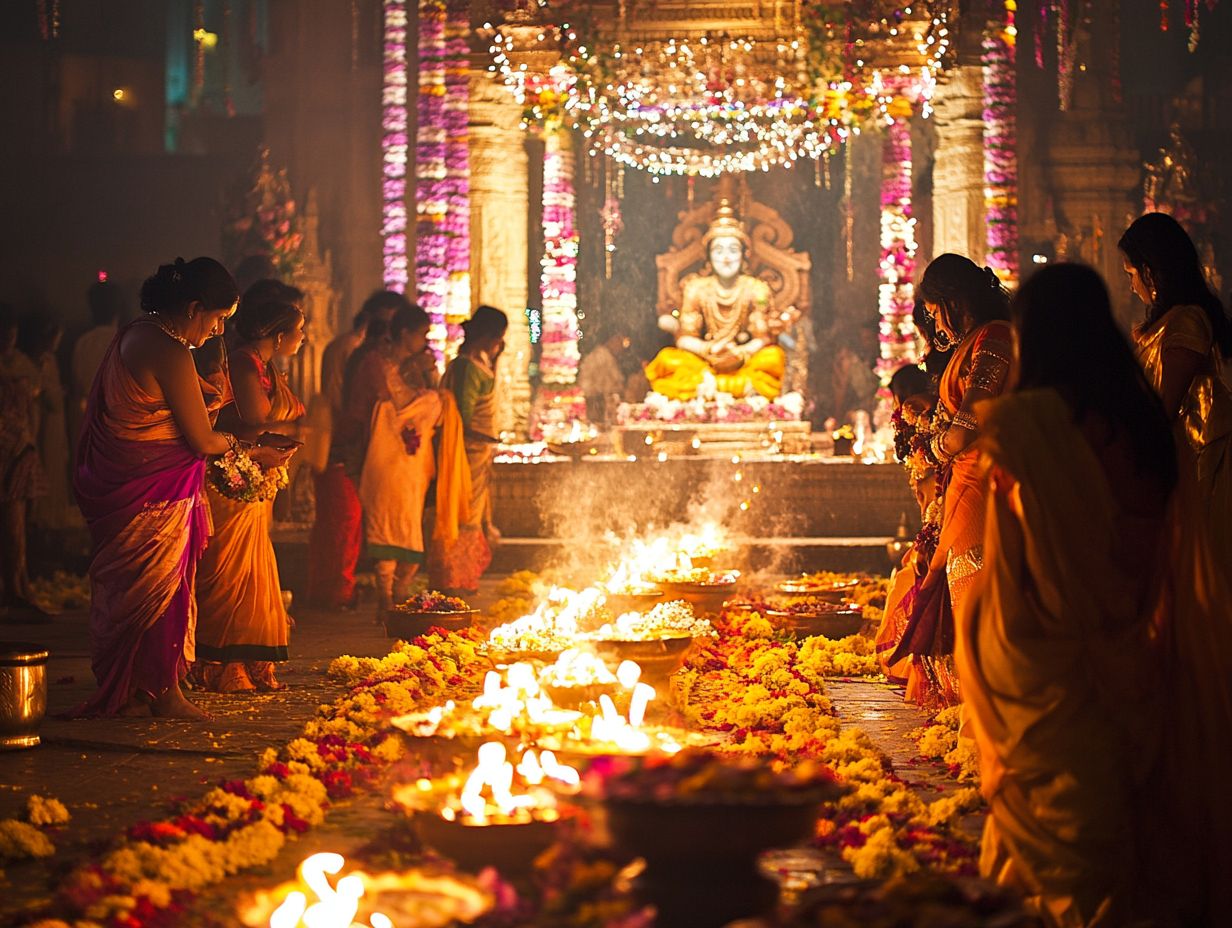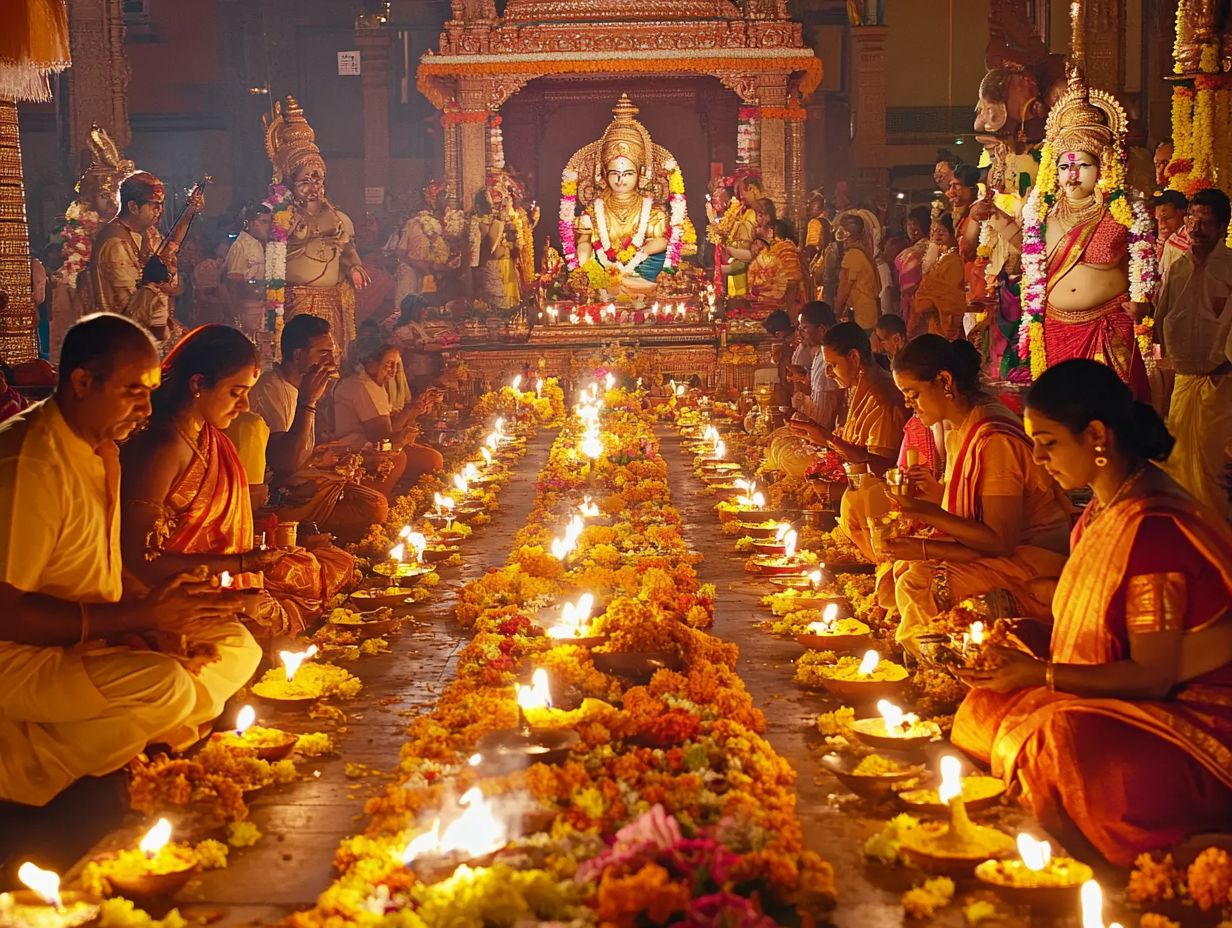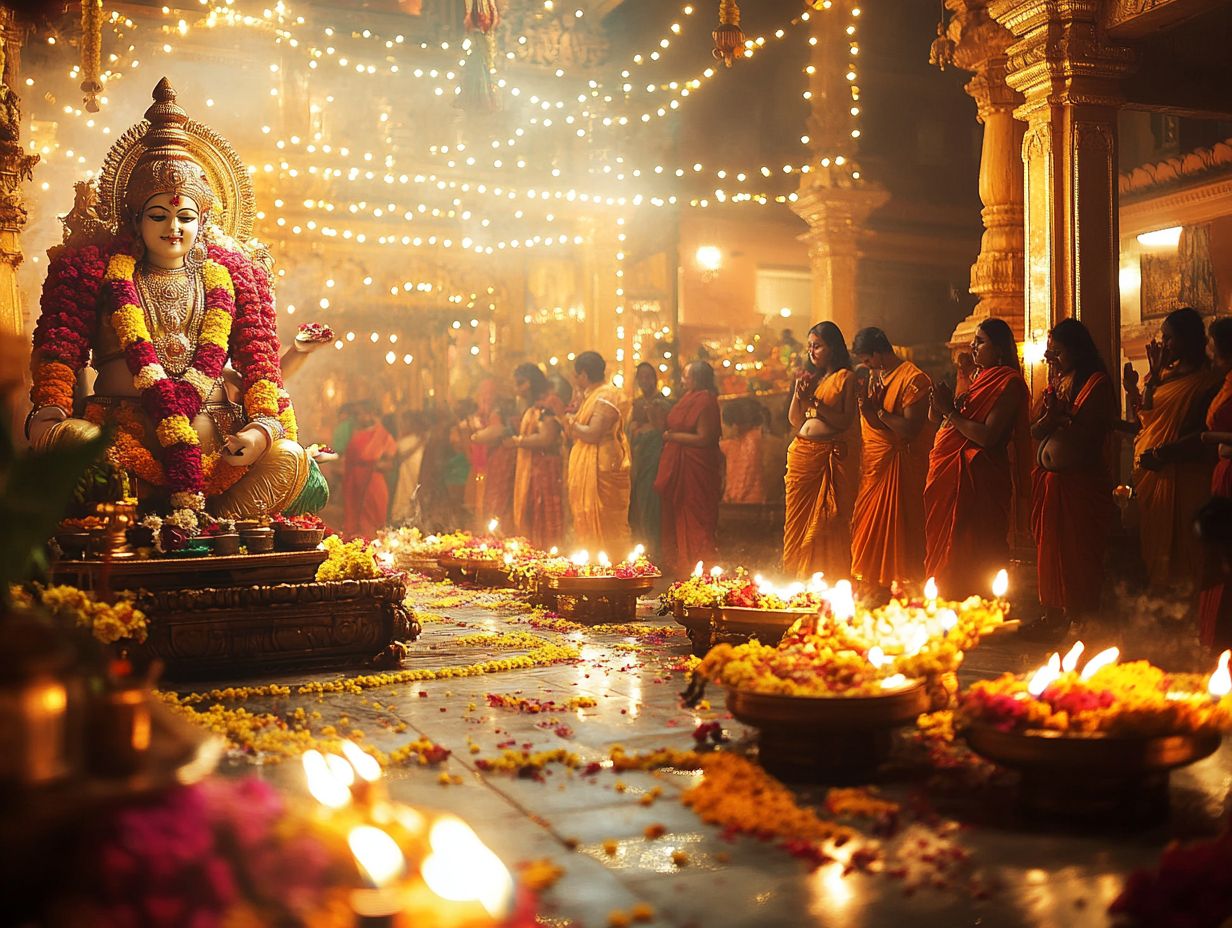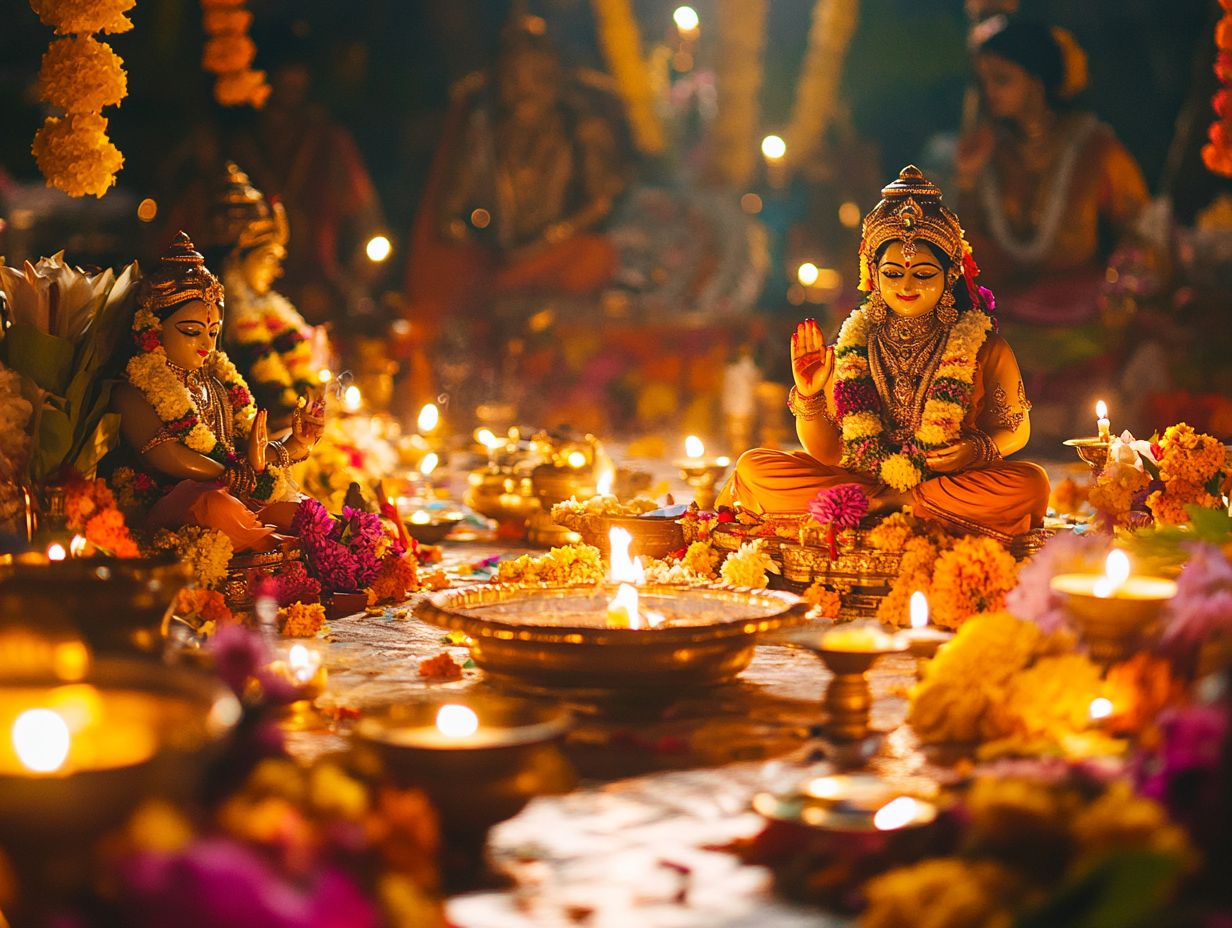What Are Religious Customs in Hinduism?
Hinduism, regarded as one of the world’s most ancient religions, is characterized by a rich tapestry of diverse customs and practices that profoundly influence the lives of its adherents.
This article delves into the core of Hindu religious customs, highlighting the vibrant festivals that punctuate the calendar and the daily rituals that nurture spiritual growth.
It further explores the significance of these traditions within Hindu society and contrasts them with practices found in other religions, illuminating their unique qualities.
Readers are invited to embark on a journey to discover the captivating realm of Hindu customs and their profound impact on individual spirituality and communal life.
What Is Hinduism?

Hinduism, recognized as one of the world s oldest religions, weaves a complex tapestry of spiritual beliefs and practices, distinguished by its rich cultural heritage and profound philosophical insights. It encompasses a diverse array of sacred texts, including the Vedas, Upanishads, and the Bhagavad Gita, all of which serve as cornerstone scriptures that illuminate the moral values and ethical conduct of its adherents.
Central to Hinduism are the concepts of karma and dharma, which intricately shape the moral compass and life choices of individuals across generations. This dynamic religion also engages with the complexities of the caste system, underscoring its multifaceted nature and enduring relevance.
What Are Religious Customs in Hinduism?
Religious customs within Hinduism encompass a rich array of rituals and ceremonies, profoundly anchored in the spiritual practices intrinsic to the faith. Among these customs, puja stands out, involving offerings and prayers dedicated to deities, alongside various sacred rituals that commemorate significant life events, such as birth ceremonies and marriage rites.
The significance of meditation in personal devotion, coupled with an emphasis on family traditions, further highlights the multifaceted nature of Hindu customs as authentic expressions of faith and spirituality.
Community worship, performed in temples and during vibrant festivals, not only reinforces the bonds of devotion among practitioners but also weaves a dynamic tapestry that represents the essence of Hindu life.
What Are the Major Hindu Festivals?
The major festivals of Hinduism Diwali, Holi, Navratri, and Raksha Bandhan are vibrant celebrations imbued with profound cultural and spiritual significance. Each festival is a unique tapestry of customs and traditions, reflecting the rich diversity inherent within Hindu culture.
Diwali, often heralded as the Festival of Lights, symbolizes the triumph of light over darkness and good over evil. In contrast, Holi marks the arrival of spring, celebrated with an exuberance of colorful powders and joyous gatherings. Navratri pays homage to the divine feminine through nine nights of worship, while Raksha Bandhan honors the sacred bond between siblings, exemplifying the richness of seasonal festivals that cultivate community and familial ties.
These festivities are deeply entrenched in ancient mythology, often narrating stories that have been cherished and passed down through generations. During Diwali, homes are adorned with flickering oil lamps and intricate rangoli designs, inviting prosperity and happiness into the household. The exuberance of Holi signifies not only the end of winter but also underscores the values of love and forgiveness, fostering a spirit of community bonding.
Navratri, characterized by rhythmic dances and vibrant attire, invites participants to engage in the worship of various goddesses, creating a profound sense of unity and devotion among devotees.
Meanwhile, Raksha Bandhan highlights the promise of protection between brothers and sisters, weaving a tapestry of familial love that resonates throughout the celebrations. Such gatherings transcend mere festivity; they serve to fortify social ties, instill essential values, and transmit cultural heritage, rendering them invaluable to Hindu identity.
What Are the Daily Religious Practices in Hinduism?
Daily religious practices in Hinduism serve as a cornerstone of a devotee’s spiritual journey, encompassing rituals that cultivate a profound connection with the divine. Among these practices are prayer, meditation, and yoga, each playing a vital role in fostering mindfulness and inner peace.
The act of chanting sacred mantras is particularly significant, as it invokes spiritual energy and devotion, creating a bridge between the material and spiritual realms. These daily rituals not only enrich individual spirituality but also reinforce family values and community connections, exemplifying the harmony between personal faith and social customs.
Engaging in these sacred activities offers a structured framework for reflection and spiritual growth, encouraging seekers to explore deeper meanings in their everyday lives. Meditation provides a sanctuary for introspection, enabling devotees to quiet the clamor of the external world and delve into their inner selves.
Prayer, in turn, serves as a conduit for communication with the divine, facilitating expressions of gratitude, requests, or simple conversations that fortify one s faith. Yoga harmonizes body, mind, and spirit, promoting physical well-being alongside spiritual advancement.
Together, these practices create a rich tapestry of devotion that nurtures personal enlightenment while fostering unity within the broader community.
What Are the Rituals Performed in Hinduism?
Rituals in Hinduism encompass a rich tapestry of sacred practices that mark significant life events and nurture spiritual growth. These rituals include rites of passage, such as birth ceremonies that celebrate the arrival of new life and death rituals that honor the deceased, aiding their journey in the afterlife.
Marriage rituals exemplify the union of two individuals and their families, underscoring the importance of dharma and familial bonds. Each of these spiritual practices embodies deep respect and reverence, serving to strengthen community ties and uphold cultural identity within the diverse expressions of Hinduism.
Beyond these major life events, various other rituals, such as the naming ceremony known as ‘Namkaran’, hold a special place in welcoming a newborn into the family, symbolizing their cultural and spiritual heritage.
Similarly, the ‘Shraddha’ rituals performed for ancestors during death observances highlight the belief in honoring the past and ensuring that their souls attain peace. The elaborate marriage customs, including ‘Saptapadi’ or the seven steps, signify the commitment and responsibilities shared between partners.
Each ritual not only serves a spiritual purpose but also reinforces community relationships and values, providing a framework for social interactions and fostering a shared sense of belonging among practitioners.
What Is the Importance of Religious Customs in Hinduism?

The significance of religious customs in Hinduism is evident in their profound influence on spiritual development and the nurturing of moral values and ethical conduct among practitioners. These customs function as guiding principles, helping withdividuals in navigating their spiritual journeys while fostering communal worship and fortifying familial bonds.
Through engagement in rituals, festivals, and daily practices, Hindus forge connections with their cultural identity and articulate their faith, underscoring the essential role these customs play within their spiritual lives. Furthermore, they enhance communal harmony, instill respect, and cultivate reverence for the divine, ultimately contributing to a cohesive social fabric.
How Do Religious Customs Help in Spiritual Development?
Religious customs hold a crucial role in nurturing spiritual development within Hinduism, offering structured practices that guide individuals toward self-awareness and ethical living. Engaging in meditation, participating in rituals for purification, and observing auspicious days facilitate a profound connection with the divine while enhancing one’s comprehension of dharma and karma.
These customs inspire adherents to reflect on their moral values and ethical conduct, underscoring the significance of ahimsa and respect for all living beings. Through consistent practice, individuals cultivate spiritual growth, aligning their actions with the tenets of Hindu philosophy.
Such practices not only foster inner tranquility but also act as compelling reminders of one’s duty to maintain moral integrity in daily life. For example, the observance of purification rituals before significant tasks assists devotees in starting anew, casting aside negative influences while welcoming positive energies.
Community gatherings centered around ethical discussions often emerge from these customs, further enriching the sense of belonging and shared responsibility.
By weaving meditation into their daily routines, followers establish a habit of introspection, granting them a deeper understanding of their actions and their effects on the world around them. These traditions cultivate a harmonious balance between individual spiritual journeys and collective moral accountability.
What Is the Significance of Religious Customs in Hindu Society?
The significance of religious customs within Hindu society is profound, as they play a crucial role in reinforcing cultural identity, fostering social cohesion, and facilitating community worship among practitioners. These customs embody family traditions and social practices that have been meticulously passed down through generations, thereby upholding a sense of continuity and belonging. They also serve as a platform for interfaith dialogue and the promotion of respect for diverse beliefs, reflecting the ethical conduct and moral values intrinsic to Hindu philosophy.
Through active participation in festivals, rituals, and communal gatherings, individuals contribute to a rich tapestry of social life that honors both tradition and modernity.
The role of these customs transcends individual communities; they foster connections across various groups, nurturing an environment of mutual understanding and empathy. By engaging in shared practices, communities not only fortify their cultural identity but also build bridges with others, transcending the barriers of ethnicity and religion.
This collective participation cultivates a sense of belonging that is vital for psychological well-being and social stability. Ultimately, the enduring nature of these customs exemplifies their importance in shaping harmonious societies where diversity is cherished, and common values are celebrated.
What Are the Different Forms of Worship in Hinduism?
The various forms of worship in Hinduism exemplify the rich diversity of faith and devotion demonstrated by its adherents. Among these practices, puja emerges as a pivotal ritual, wherein practitioners offer prayers, flowers, and food to deities, creating both a personal and communal expression of divine reverence.
Yagna, a sacred fire ritual, is conducted to honor the gods and invoke blessings for prosperity and harmony. Meanwhile, bhakti, which embodies profound love and devotion towards a personal god, highlights the emotional bond between the devotee and the divine.
Together, these elements weave an intricate tapestry of spiritual practices that define Hindu worship.
What Is Puja?
Puja stands as a profoundly significant form of worship within Hinduism, wherein devotees engage in a series of spiritual rituals that reflect their reverence and devotion to the deities. This cherished practice typically includes offerings such as flowers, fruits, and incense, accompanied by prayers and the chanting of sacred mantras.
Puja may be performed in the intimate setting of one’s home or within the grandeur of temples, facilitating both individual reflection and communal worship experiences. The ritual is designed to create a sacred atmosphere that invites the divine presence and blessings, thereby reinforcing the spiritual connection between the devotee and the divine.
At its core, puja embodies a deeply symbolic act, underscoring the essential roles of intention and mindfulness within the rituals performed. Each offering carries its own significance; for example, flowers symbolize purity, while fruits stand as representations of the divine gift of prosperity.
Variations of puja arise depending on the occasion be it daily worship, festive celebrations, or significant life events each tailored to reflect cultural nuances and personal beliefs. The communal aspect of puja, particularly during festivals, fosters a profound sense of unity among devotees, as they gather to partake in shared practices, thereby enhancing not only their individual spirituality but also their collective identity.
What Is Yagna?

Yagna is a sacred fire ritual intricately woven into the fabric of Hindu tradition, designed to invoke the divine and seek blessings for the well-being of both individuals and communities.
These ceremonies exude a profound spirituality that fills the atmosphere, as participants unite in the sacred act of offering. The act of placing various ingredients into the fire symbolizes a surrender of personal desires and an embrace of divine will. Each element, from the aromatic herbs to the pure ghee, is meticulously selected to enhance the ritual’s efficacy and to signify a deep connection with nature and the cosmos.
Through this collective engagement, yagna transcends individual boundaries, serving as a poignant reminder of everyone s shared responsibility towards one another and fostering a spirit of camaraderie. Ultimately, yagna emerges as a powerful vessel for community bonding, while also acting as a conduit for divine grace.
What Is Bhakti?
Bhakti, an essential component of Hindu worship, underscores the significance of deep devotion and love directed towards a personal god, thereby nurturing a profound spiritual connection between the devotee and the divine. This mode of worship elevates itself beyond mere ritualistic practices, centering on emotional engagement and the heartfelt expression of devotion.
The journey through bhakti is characterized by a myriad of practices that invite followers to authentically articulate their feelings. Devotees frequently engage in the chanting of mantras and the singing of devotional songs, which function not only as acts of worship but also as avenues for cultivating an intimate relationship with the divine.
This emotional richness inherent in bhakti transforms ordinary prayers into vibrant expressions of love, enabling individuals to experience a profound sense of belonging and acceptance. By surrendering to this path of devotion, practitioners often uncover a deep-seated peace and inner strength, discovering their identities as they connect with something far greater than themselves.
How Do Religious Customs in Hinduism Differ from Other Religions?
Religious customs in Hinduism stand apart from those of other religions in several distinctive ways, mirroring the unique cultural and spiritual tapestry of this ancient faith. While many religious traditions prioritize communal worship and rituals, Hindu customs are marked by a rich diversity that embraces a multitude of deities, sacred texts, and philosophical systems.
Hindu practices frequently encompass a harmonious blend of rituals, festivals, and personal devotion, permitting a broader spectrum of expressions of faith. This inherent diversity not only enhances the complexity of Hinduism but also promotes interfaith dialogue and understanding, illuminating both the cultural differences and shared values found among various spiritual practices.
What Role Do Rituals Play in Hinduism Compared to Other Religions?
Rituals occupy a central position in Hinduism, serving as essential expressions of spiritual significance and cultural practices that intricately connect devotees to their faith. These acts of devotion not only pay homage to the divine but also weave a tapestry of community bonds, cultivating a shared sense of identity among practitioners.
In contrast to some religions that adhere to a more standardized approach to ritualistic practices, Hinduism embraces a personalized and flexible interpretation. This allows individuals to adapt rituals to their unique circumstances and environments. The spiritual journey within Hinduism frequently encompasses various rites of passage, such as marriage and naming ceremonies, which reflect key life milestones imbued with profound cultural meaning.
This adaptability enhances not only personal faith but also enriches the communal fabric, highlighting the intricate relationship between spirituality and cultural identity.
How Do Hindu Festivals Differ from Festivals in Other Religions?
Hindu festivals stand apart from those of other religions, marked by their profound cultural significance, diverse themes, and communal celebrations that often extend over several days. Festivals such as Diwali and Holi serve not only as commemorations of mythological events but also embody the changing seasons and the victory of good over evil, intricately woven into the rich tapestry of Hindu cosmology.
In contrast, festivals observed in other religions may center around specific historical events or teachings, frequently accompanied by distinct customs and practices. The participatory essence of Hindu festivals fosters community involvement, highlighting the importance of shared cultural heritage and values.
This communal spirit is vividly illustrated by the way families and neighborhoods unite to adorn their homes, prepare special dishes, and engage in prayer rituals, cultivating an atmosphere filled with unity and joy. While certain religious celebrations may emphasize individual reflection or solemn observance, Hindu festivities prioritize collective experiences, thereby reinforcing social bonds.
For example, during Pongal, which celebrates the harvest, families come together to feast and partake in traditional games, encapsulating joy and gratitude.
Such vibrant celebrations illuminate not only spiritual connections but also an appreciation for nature and abundance, creating a unique amalgamation of divine and earthly significance that resonates deeply within the community.
What Are the Differences in Daily Religious Practices in Hinduism and Other Religions?

The distinctions in daily religious practices between Hinduism and other faiths are strikingly clear, marked by the diverse array of spiritual rituals, customs, and devotional approaches that define each belief system. Hinduism celebrates various festivals such as Diwali, Holi, and Ganesha Chaturthi, each with its own unique set of practices and significance.
In Hinduism, daily practices frequently encompass meditation, prayer, and personal rituals that cultivate a direct connection with the divine. These practices often include the chanting of mantras and adherence to the principles of dharma and karma. This is in sharp contrast to other religions, which may prioritize communal worship or structured liturgies as the primary means of spiritual engagement.
The inherent flexibility and individualization of Hindu practices facilitate a profound exploration of faith, accommodating personal beliefs and cultural backgrounds while underscoring the rich tapestry of spiritual expression found across various religions. This adaptability is evident in the diversity of ceremonies and spiritual practices that cater to different aspects of life.
For example, unlike the structured prayer services typical in Christianity or the five daily prayers mandated in Islam, Hindus often engage in their spiritual routines at their own pace, seamlessly weaving family traditions and local customs into their practices. This adaptability not only mirrors the vast array of beliefs within Hinduism but also manifests in rituals such as puja, which can differ significantly from one community to another. Additionally, yoga and fasting are common practices that reflect the spiritual diversity within Hinduism.
While numerous religions encourage lifelong spiritual journeys, Hinduism particularly emphasizes the cyclical nature of life and rebirth, a perspective that significantly influences practitioners’ daily actions and spiritual contemplations. The concept of samskara plays a crucial role in marking the various stages of life, from birth to death. These subtle nuances reveal how personal engagement with spirituality can vary fundamentally among faiths, fostering both unique and shared experiences in the ongoing quest for meaning and spiritual evolution.
Frequently Asked Questions
What are religious customs in Hinduism?
Hinduism is a diverse religion that has a variety of customs and rituals. Some of the common religious customs in Hinduism include prayer, worship, pilgrimage, and rituals for specific occasions, such as festivals and rites of passage.
Hinduism is a diverse religion that has a variety of customs and rituals. Some of the common religious customs in Hinduism include prayer, worship, pilgrimage, and rituals for specific occasions.
How important are religious customs in Hinduism?
Religious customs hold a significant role in Hinduism as they help individuals connect with their spiritual selves and the divine. They also help preserve the cultural and traditional aspects of the religion through practices such as puja, ceremonies, and family traditions.
Religious customs hold a significant role in Hinduism as they help individuals connect with their spiritual selves and the divine. They also help preserve the cultural and traditional aspects of the religion.
What is the significance of prayer in Hinduism?
Prayer is an essential part of Hinduism as it is believed to help individuals seek blessings and guidance from the divine. It is also considered a way to express gratitude and devotion towards the deities. Through prayer, Hindus often seek to improve their karma and align with the cosmic order.
Prayer is an essential part of Hinduism as it is believed to help individuals seek blessings and guidance from the divine. It is also considered a way to express gratitude and devotion towards the deities.
What is the purpose of worship in Hinduism?
Worship is a way to honor and show reverence to the deities in Hinduism. It is believed that through worship, individuals can gain spiritual strength, wisdom, and blessings from the divine. Worship practices often involve various offerings to deities, including food, flowers, and incense.
Worship is a way to honor and show reverence to the deities in Hinduism. It is believed that through worship, individuals can gain spiritual strength, wisdom, and blessings from the divine.
Why do Hindus go on pilgrimages?
Pilgrimage is an important religious custom in Hinduism as it allows individuals to visit sacred sites and connect with their spiritual roots. It is also believed that going on a pilgrimage can help individuals attain spiritual purification and blessings. Sites like the Ganges River and holy cities like Varanasi are among the most revered pilgrimage sites.
Pilgrimage is an important religious custom in Hinduism as it allows individuals to visit sacred sites and connect with their spiritual roots. It is also believed that going on a pilgrimage can help individuals attain spiritual purification and blessings.
What are some common rituals in Hinduism?
Some common rituals in Hinduism include puja (worship), havan (fire ceremony), aarti (offering of light), and samskaras (rites of passage). These rituals vary depending on the region and traditions followed by different communities. Major festivals like Diwali and Navaratri also involve specific ritualistic practices.
Some common rituals in Hinduism include puja (worship), havan (fire ceremony), aarti (offering of light), and samskaras (rites of passage). These rituals vary depending on the region and traditions followed by different communities.
